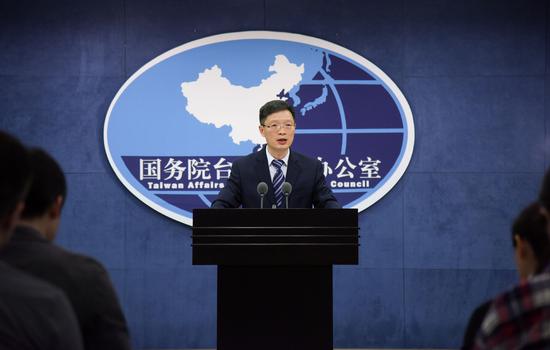
An Fengshan, spokesman for the Taiwan Affairs Office of the State Council, answers questions at a press conference in Beijing on March 28, 2018. (Photo/Xinhua) The revocation of the right of Taichung in central Taiwan to host the 2019 East Asian Youth Games is due to the island's failure to abandon the illusion of "Taiwan independence", and the island's administration is fully responsible for losing the privilege, scholars said. The East Asian Olympic Committee recently canceled the city's right to host the event because of provocative actions by some "pro-independence" groups in Taiwan. In 2014, the EAOC granted the city of Taichung the right to host the games to support the promotion of the Olympics and sports development in Taiwan. However, some groups on the island pushed forward a "referendum" that proposed that when the island participated in future international sports events-such as the 2020 Tokyo Olympic Games-it does so under "a proper name", implying possible use of "Republic of China" or "Taiwan", instead of "Chinese Taipei", which is a denial of the one-China policy. In accordance with rules of the International Olympic Committee, "Chinese Taipei" has for several decades been used as an official name for the island when it takes part in international sports events, and the name is widely recognized and agreed upon in the international community. It remains unclear whether the games will be hosted by another city next year, or canceled outright. "We have always opposed political interference in sports, and have on several occasions expressed a firm stance against 'referendum' provocations," said An Fengshan, spokesman for the Taiwan Affairs Office of the State Council, on Wednesday. The International Olympic Committee said it is not considering any change to the name of the Chinese Taipei Olympic Committee. But some political forces continued to push forward the "referendum". For the healthy development of the Olympics, the EAOC revoked Taichung's right to host the games next year in accordance with rules, secretary-general of the EAOC Song Luzeng told Xinhua News Agency on Tuesday. "Some political forces and 'Taiwan independence' elements on the island, allowed by the Democratic Progressive Party administration, have flagrantly challenged the 'Olympic model', bringing huge risks of political disturbances to the games," An said. He urged the DPP administration to return to the peaceful development path of cross-Straits relations based on the 1992 Consensus, which embodies the one-China policy, and cease harming or sacrificing the interests of the people for its own political purposes. The DPP administration should stop provoking hostility and confrontation across the Taiwan Straits and end its persistence in this delusion. The mainland will continue to support cross-Straits exchanges in various fields, including sports, and contribute more positive energy to the peaceful development of cross-Straits relations, An said. "The 'referendum' is a move that indicates 'Taiwan independence', and the mainland should be vigilant with that," said Wang Hailiang, a Taiwan studies researcher at Shanghai Academy of Social Sciences. He said it is a correct decision for the mainland to uphold its stance. "Otherwise, it will grant motivation and space for 'Taiwan-independence' groups and the DPP administration to promote 'Taiwan independence'," he said. "The revocation tells Taiwan society and the administration not to harbor any illusions of 'Taiwan independence'," Wang said. Wang said that international society is in accordance with the one-China policy in various international activities, including the Olympic Games. "The EAOC just follows the rules," he said. "The Taiwan administration is fully responsible for losing the hosting of the games," said Zhu Songling, a professor specializing in Taiwan studies at Beijing Union University. The Taiwan administration has ignored the EAOC's warning against a "referendum" and indulged such behaviors, Zhu noted. Under such circumstances, international sports organizations have to evaluate potential risks and conducted a vote to re-evaluate Taichung's qualification to host the games, he said. Members of the EAOC voted to disqualify Taichung from hosting the games, Zhu said. "If the warning were heeded by the Taiwan authority, Taichung's hosting qualification may not have been canceled," Zhu said. Geng Shuang, spokesman for the Foreign Ministry, said on Wednesday that the one-China policy is the political foundation for the steady development of China-U.S. relations. He urged the United States to uphold the one-China policy and the three joint communiques between China and the U.S. Geng was responding to remarks from the U.S. State Department to support Taiwan, not as a country, but in its efforts to organize the games. |